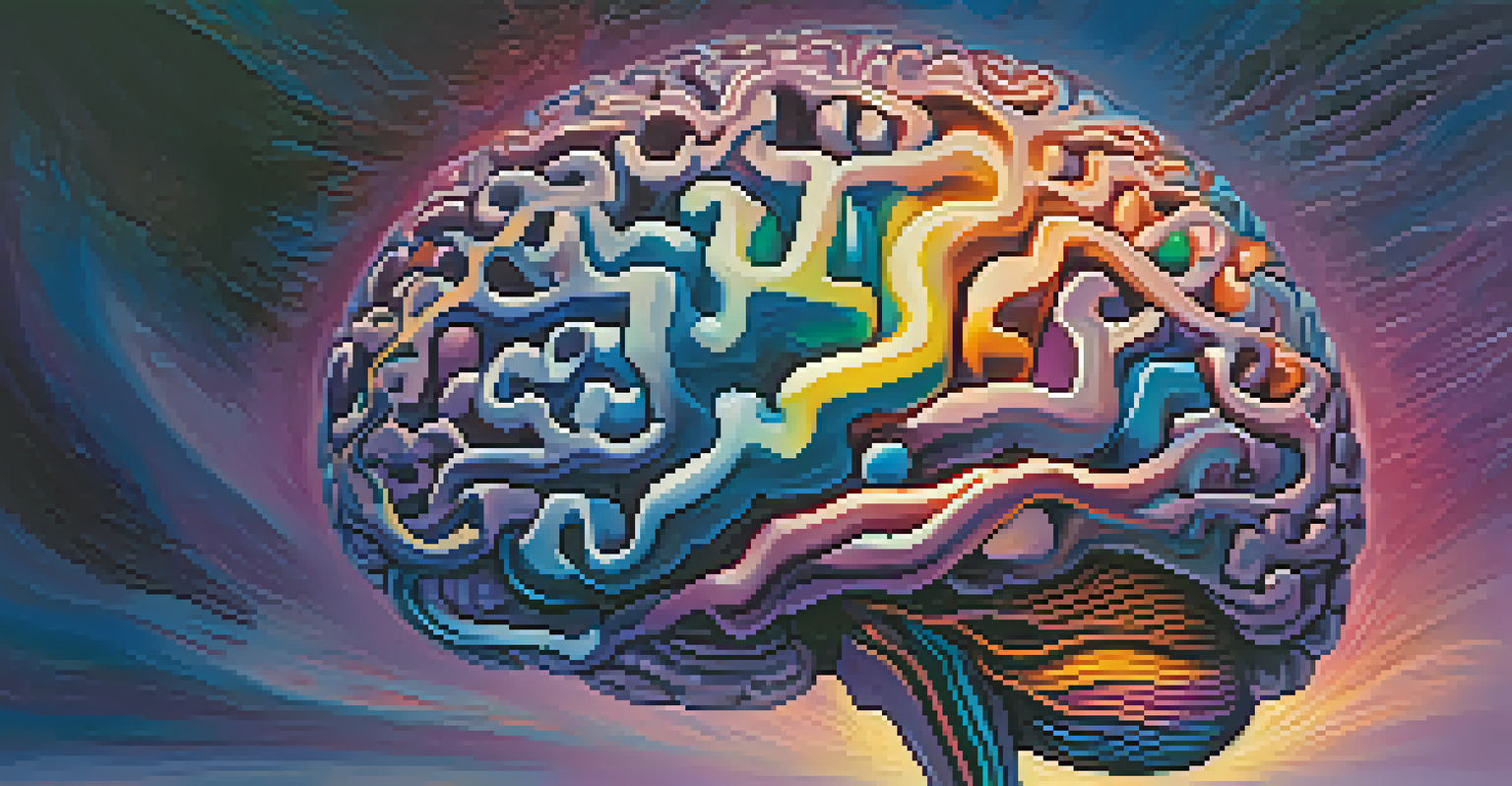Hallucinogens: A New Approach to Community Mental Health

Understanding Hallucinogens and Their Effects
Hallucinogens are substances that alter perception, mood, and cognitive processes. Common examples include psilocybin, found in certain mushrooms, and LSD, a synthetic compound. These substances can lead to profound changes in consciousness, sometimes resulting in experiences that users describe as spiritual or life-changing.
The greatest discovery of my generation is that a human being can alter his life by altering his attitude.
While hallucinogens have often been stigmatized due to their association with recreational use, recent research has revealed their potential therapeutic benefits. Studies suggest they can help treat various mental health conditions, such as depression, PTSD, and anxiety. This emerging understanding is paving the way for a reevaluation of how we view these compounds in the context of community health.
The growing interest in hallucinogens aligns with a broader movement towards integrating alternative therapies into mental health care. As communities seek innovative solutions, the possibility of incorporating hallucinogenic treatments offers a new frontier for healing and support.
The Science Behind Hallucinogens and Mental Health
Recent scientific studies have shown that hallucinogens can facilitate neuroplasticity, the brain's ability to reorganize itself. This means that they may help individuals break free from entrenched patterns of thought and behavior, which is particularly beneficial for those suffering from mental health disorders. For instance, research indicates that psilocybin can 'reset' brain activity in individuals with depression, leading to significant improvements in mood and outlook.

Moreover, the therapeutic use of hallucinogens often involves guided sessions with trained professionals. This approach ensures that individuals are supported throughout their experience, making it safer and more effective. The combination of these substances with psychotherapy can create a powerful synergy, amplifying the benefits of both.
Therapeutic Potential of Hallucinogens
Recent studies suggest hallucinogens may effectively treat mental health disorders like depression and PTSD.
Understanding the underlying mechanisms of how hallucinogens work is crucial for their acceptance in the mental health community. As more research emerges, it becomes increasingly clear that these substances could play a pivotal role in innovative treatment models designed to address the complex needs of individuals and communities.
Challenges and Misconceptions Surrounding Hallucinogens
Despite promising research, hallucinogens still face significant stigma and misconceptions. Many people associate these substances solely with recreational use or harmful effects, which can overshadow their potential benefits. Education and awareness are vital to challenge these outdated beliefs and foster a more informed dialogue about their therapeutic applications.
Your present circumstances don’t determine where you can go; they merely determine where you start.
Another challenge is the legal status of many hallucinogenic substances. In some regions, they remain classified as illegal drugs, which can hinder research and limit access for those who may benefit from them. Advocacy for policy reform is essential to create a more supportive environment for scientific exploration and therapeutic use.
Addressing these challenges requires a collaborative effort among researchers, healthcare professionals, and community leaders. By promoting open conversations and sharing success stories, we can gradually shift perceptions and pave the way for the responsible integration of hallucinogens into mental health care.
Community-Based Approaches to Hallucinogen Therapy
One of the most exciting aspects of hallucinogen therapy is its potential for community-based applications. Programs that incorporate these substances can foster a sense of connection and healing among participants. This communal approach not only enhances the therapeutic experience but also builds support networks that are crucial for long-term recovery.
For example, group therapy sessions that include hallucinogenic experiences can create a shared space for vulnerability and understanding. Participants may find solace in knowing they are not alone in their struggles, which can lead to powerful breakthroughs and emotional healing. This sense of community can be a transformative element in the recovery process.
Community-Based Healing Approaches
Incorporating hallucinogen therapy into community health initiatives fosters connection and support among participants.
By integrating hallucinogen therapy into community health initiatives, we can address mental health issues more holistically. This shift emphasizes the importance of social support and collective healing, which are often overlooked in traditional mental health care models.
The Role of Education in Hallucinogen Therapy
Education plays a crucial role in the successful integration of hallucinogens into community mental health care. It is essential for both practitioners and the public to understand the potential benefits, risks, and appropriate contexts for use. Comprehensive training for therapists and healthcare providers can ensure that they are equipped to guide individuals safely through their experiences.
Additionally, community workshops and informational sessions can help demystify hallucinogens for the general public. By providing accurate information and addressing concerns, these initiatives can cultivate a more informed and open-minded community. This kind of education can empower individuals to make informed choices about their mental health treatment options.
Ultimately, fostering an educational environment that emphasizes safety, responsibility, and respect can help pave the way for a new era of mental health care that embraces the potential of hallucinogens.
Personal Stories: Transformative Journeys with Hallucinogens
Many individuals have shared powerful stories of transformation through hallucinogen therapy. These personal accounts often highlight how their experiences led to significant shifts in perspective and emotional healing. For example, someone struggling with severe anxiety might describe a session where they confronted their fears in a profound, new way, leading to lasting changes in their daily life.
These narratives serve not only as inspiration but also as valuable insight into the therapeutic process. Hearing firsthand how hallucinogens have positively impacted others can help demystify the experience and encourage those who are hesitant to explore this option. Personal stories can bridge the gap between skepticism and understanding, fostering a sense of hope.
Education is Key for Acceptance
Comprehensive education about hallucinogens can help dispel misconceptions and promote responsible use in mental health care.
As communities begin to share these journeys, a cultural shift can occur, normalizing the conversation around hallucinogen therapy and its potential. This growing collection of experiences can contribute to a broader acceptance of alternative treatments within mental health care.
Looking Ahead: The Future of Hallucinogen Therapy in Mental Health
As research continues to advance, the future of hallucinogen therapy in mental health looks promising. With increasing interest from both the scientific community and the public, we may soon see more structured programs and policies that support the safe use of these substances. This evolution could lead to a paradigm shift in how we approach mental health care.
The potential for hallucinogens to complement existing therapies presents an exciting opportunity for innovation. Imagine a world where individuals can access a range of treatment options, including hallucinogen therapy, tailored to their unique needs. This holistic approach could empower people to take control of their mental health in ways previously thought impossible.

Ultimately, the integration of hallucinogens into community mental health care represents a step towards a more compassionate and effective system. By embracing new ideas and fostering collaboration, we can work towards a future where mental health support is accessible, inclusive, and transformative.